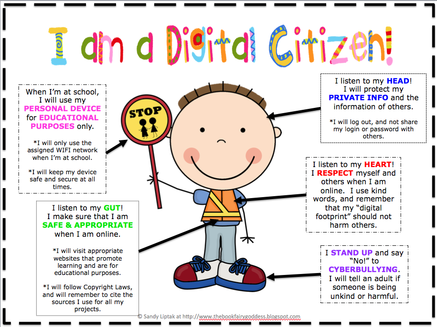|
Like any behaviours that teachers want to instill in their students, the expectations for behaviours need to be laid out at the beginning of the year. Within the first week of school, students engage in a lesson about the acceptable use policy. They are then expected to take a copy home, sign it and review it with their parents before returning it. All students in the Primary school begin with this routine. From there, it is easy to reference back to as the students begin to do activities. Teachers must be fully versed in the acceptable use policy as well and hold their students to this standard. Our acceptable use policy is quite thorough for students and focuses on the following topics: respectful, responsibility, care for devices, privacy, accessing appropriate information, referencing, discipline and social media (Chatsworth, 2015). Another important aspect of teaching students about digital citizenship is actually modelling it as a teacher. It is extremely frustrating as a education technology coach when teachers ask me how to do things that are illegal, not aligned with our acceptable use policy or incorrectly. If teachers do not model how to be a good digital citizen, how can we expect our students to? As teachers, we should be showing students how to engage appropriately with emails, citing our work and referencing images in presentations. We need to be leading the way when our students turn to use for the standard. One way I have done this is set up an email writing programme in the past where students email me each week and I respond with an email. From this, students understand the format of an email, appropriate email communication all while building their written communication skills and rapport with the teacher.
Digital citizenship should be embedded into the curriculum and not taught in isolation. Students need to make meaning of it by connecting it to real life experiences inside and outside of the classroom. The Year 6 students are currently doing their puberty unit and learning about body image. This also translate into their online image and how they see themselves. The teachers and students are having conversations about the impact of media and social media on their views of themselves and the images they also share. They are also discussing how to communicate appropriately on social media platforms. These topics are completely integrated, giving students context for the topics. There are also those times when teachable moments arise. Perhaps someone posts something inappropriately online or you see another student properly reference images. These are great conversations to have in the moment even though they weren't planned. When questions come up from students about something online, you shouldn't shy away from it but rather support the student's inquiry and help build their digital citizenship schema. One of the other things as an educator I need to be cognizant about is that educating a child is a partnership between the school and home. This is why we also need to educate our parent community. When I was a homeroom teacher, I made sure that my class parents were informed regularly about what we were doing in our classroom, the technologies we were using and conversation starters they could have with their children. As an education technology coach, I work with members of our leadership team to develop and conduct parent sessions related to their child's technology use. We also have an open door policy for parents to drop in and ask questions whenever they need to. Educating our students to become good digital citizens is not an easy task and not a task that can be accomplished in a year. It requires the whole school to approach digital citizenship as the way of moving forward. Currently our school is looking to build a digital citizenship curriculum that is integrated into various units from kindergarten to Year 13. Together with a whole school approach, we can work to support and model good digital etiquette for our students to follow. References Chatsworth International School. (2015). Acceptable Use Policy - Chatsworth Group of Schools [internal document].
0 Comments
Leave a Reply. |
Archives
February 2019
Categories
All
|

 RSS Feed
RSS Feed